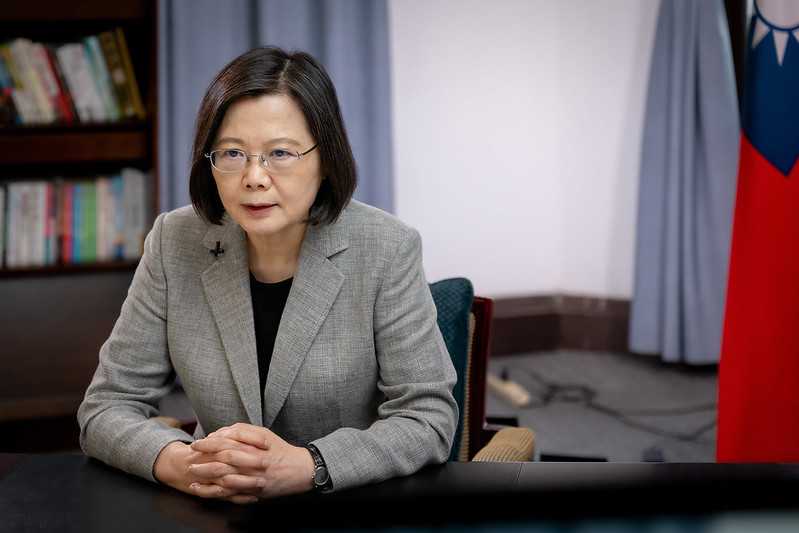News & activities
 News releases
News releases
On the morning of September 20 (noon of September 19 local time in New York, the summit venue), President Tsai Ing-wen addressed the 2022 Concordia Annual Summit via video at the invitation of the non-profit organization Concordia.
In remarks, President Tsai said that Taiwan has been confronted by increasingly aggressive threats from China in recent years – including military intimidation, gray zone activities, and influence operations – in an attempt to corrode the democratic way of life we have been working so hard to sustain.
President Tsai emphasized that democratic values are now an integral part of Taiwanese identity, and that securing Taiwan's democracy is imperative to ensuring freedom and human rights for our collective future. The president also expressed confidence that, as we move toward the post-pandemic era and the challenges we face become more profound, we can achieve our goals by standing united behind our shared values and beliefs.
A transcript of President Tsai's speech follows:
I would like to begin by thanking the Concordia Annual Summit for inviting me to speak at this important forum. It is an honor to be alongside this year's prominent and impressive speakers from many diverse sectors.
I must say that this summit could not have convened at a more consequential time. At this moment, democracies and the rules-based world order are facing the greatest challenges since the Cold War.
We not only have to remedy the impact of the pandemic on global health and economy. We also have to combat authoritarian regimes' attempts to corrode democratic institutions and tarnish human rights and civic space.
Russia's unprovoked invasion of Ukraine and the daily threats Taiwan faces are all evidence that shows authoritarian regimes will do whatever it takes to achieve expansionism.
This all adds to the other challenges of our time, such as environmental sustainability, financial inclusion, technology, and supply chain security.
Taiwan underwent democratization a few decades ago. And, since then, we have been working diligently to consolidate our democracy. Democracy and its values are now an integral part of our identity.
In recent years, Taiwan has been confronted by increasingly aggressive threats from China, from military intimidation and gray zone activities to influence operations. All for its attempt to corrode what we have been working so hard for – that is, our democratic way of life.
As a result, Taiwanese have been working even harder to resolve such challenges.
We did not shy away from the challenge of authoritarian interference. Instead, we met it head-on and fought against forces looking to undermine our democracy.
Now, we are eager to share our experiences with you all.
At the beginning of the pandemic, Taiwan donated facial masks and medical equipment, and shared information on the COVID-19 virus with our friends from around the world. We also stand ready to assist and strengthen our collaboration with the international community. Even though Taiwan is not a member of the United Nations, we have been consistently helping the world on resolving many crises. With the inclusion of Taiwan in the UN system, I am confident that we can work even more closely to face future challenges and safeguard the rules-based international order.
As we watched the carnage of the Russian invasion, Taiwan is proud to play a role in the effort to assist the Ukrainians in their struggle to defend their country and freedom. We must continue with our efforts. We have to educate ourselves on the authoritarian playbook, and understand that Taiwan's democracy will not be the only thing the PRC seeks to extinguish. Securing Taiwan's democracy is imperative in securing freedom and human rights for our collective future.
We should also strengthen our partnerships and defend one another. The recent statements from the G7, ASEAN, and the representatives of Taiwan's diplomatic allies to the UN are all examples of the partnerships that we should formulate.
What authoritarian regimes do best is to divide and conquer. It is only when we work together and support one another, that we can succeed in fending off the expansionist goal of authoritarian regimes.
Seventy-seven years ago, the United Nations was founded for the purpose of maintaining international peace and security, giving humanitarian assistance, protecting human rights, and upholding international law. We have come a long way. And now we have a stronger shared understanding that a peaceful and secured world will not come easy. As we move toward the post-pandemic era, the challenges will only become more profound. But, by standing united in our shared values and beliefs, I am confident that we can achieve what we set out to accomplish.
I want to conclude my talk by thanking the organizers again for the invitation and for the opportunity to speak to you all. I hope the rest of the summit is successful and productive.
The Concordia Annual Summit brings together national leaders attending the UN General Assembly in New York, high-level UN officials, leaders from international organizations and civil society, and representatives from industry, academia, and politics. The eight themes of this year's summit are: democracy, security, and geopolitical risk; cultural diplomacy and youth advocacy; financial inclusion; environmental sustainability; global trade, manufacturing, and supply chains; health opportunities and challenges; human rights and social progress; and innovative technology.
Among those who addressed the summit were First Lady Jill Biden of the United States, Queen Rania Al Abdullah of Jordan, Secretary General of the Organization of American States Luis Almagro, President of the World Bank Group David Malpass, former President of the European Commission and Chair of Gavi José Manuel Barroso, the UN Secretary-General's Envoy on Technology Amandeep Singh Gill, US Ambassador to the UN Linda Thomas-Greenfield, US State Department Special Representative for Global Partnerships Dorothy McAuliffe, US State Department Under Secretary for Economic Growth, Energy, and the Environment Jose W. Fernandez, Mayor of New York City Eric Adams, and former presidents of Croatia and Colombia.









